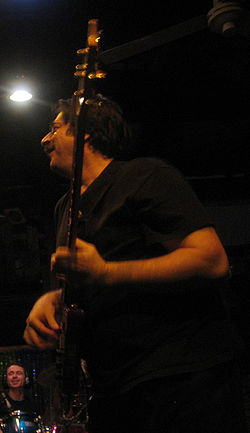Jeff Berlin Last updated October 23, 2025 American jazz fusion bassist
Jeff Berlin
Berlin performing in 2007
Born Jeffrey Arthur Berlin
(1953-01-17 ) January 17, 1953 (age 72) Genres Jazz rock progressive rock Occupation Musician Instrument(s) Bass, vocals Years active 1970 — Present Labels Denon , Rock Empire, Random Act
Musical artist
Jeffrey Arthur Berlin (born January 17, 1953) is an American jazz rock bassist and composer. He first came to prominence in the 1970s as a member of the band Bruford , led by drummer Bill Bruford .
Musical career Berlin was born on January 17, 1953, in Queens, New York . [ 1] [ 2] He studied violin from 5 until 15 years of age, when he was inspired to play bass guitar after seeing the Beatles . [ 3] He attended Berklee College of Music to study bass. [ 4] He was influenced by Jack Bruce , Paul McCartney , Tim Bogert , and Jack Casady early on, and later by Rocco Prestia and Jaco Pastorius . [ 5]
After session work with Patrick Moraz , David Liebman and Patti Austin , he gained widespread international attention in 1977 when British musician Bill Bruford handpicked him for his debut album Feels Good to Me . He played in Bruford's namesake band until 1980. His Bruford bandmate Allan Holdsworth employed Berlin for his 1983 Warner Brothers album Road Games .
Berlin continued to record and tour throughout the 1980s, 1990s and 2000s.
Style and appreciation In a review for Berlin's album Low Standards , Bass Musician Magazine said: "Anytime I mention [Jeff Berlin], there seems to be a ripple in the force and the wave of Berlin supporters or antagonists come to the surface and spout-off their opinions. No matter where you stand regarding Jeff's musical philosophy, no one can reasonably deny the simple fact that Jeff seriously knows his craft and is one of the major players of our time." [ 6]
Berlin's melodic, lead-bass playing style was heavily influenced by that of Jaco Pastorius ; despite this, Berlin has repeatedly stated his distaste for Jaco imitators. [ 7]
Personal life On August 30, 2013, Berlin married Gabriela Sinagra, a jazz singer and vocal coach from Rosario, Argentina .
Discography Solo 1985 Champion (Passport Jazz) [ 8] 1986 Pump It! (Passport Jazz) [ 9] 1997 Taking Notes (Denon ) [ 10] 1998 Crossroads (Denon) [ 11] 2000 Star Licks Master Sessions: Jeff Berlin (Star Licks Productions ) (VHS) [ 12] 2000 In Harmony's Way (M.A.J. Records, multiple re-releases) [ 13] 2004 Lumpy Jazz (M.A.J.) [ 14] 2006 Aneurythms/Ace of Bass (M.A.J.) [ 15] 2006 Mel Bay Jeff Berlin-Bass Logic from the Players School of Music (Mel Bay Publications) (DVD) [ 16] 2010 High Standards (King Japan / M.A.J.) [ 17] 2013 Low Standards (Random Act) [ 18] 2022 Jack Songs (Jeff Berlin Music Group) [ 19] References ↑ Gilbert, Mark (2002). Kernfeld, Barry (ed.). The New Grove Dictionary of Jazz . Vol. 1 (2nd ed.). New York: Grove's Dictionaries Inc. p. 201. ISBN 1-56159-284-6 ↑ Jisi, C. Brave New Bass 97. ISBN 9781617745065 . Retrieved 2015-06-22 . ↑ Mulhern, Tom (1993). Bass Heroes: Styles, Stories & Secrets of 30 Great Bass Players : from the Pages of Guitar Player Magazine 69. ISBN 978-0-87930-274-0 . Retrieved 2013-07-29 . ↑ Ake, David Andrew (2010). Jazz Matters: Sound, Place, and Time Since Bebop 144. ISBN 978-0-520-26688-9 . Retrieved 2013-07-29 . ↑ "Cliff Engel | Interviews - Jeff Berlin" . www.cliffengel.com . Retrieved 2025-10-22 . ↑ "Low Standards: Jeff Berlin" . Bass Musician Magazine . ↑ "Jeff Berlin: Whatever doesn't kill you makes you stronger!" . Bass Inside. September 2002. Archived from the original on 2007-03-11. Retrieved 2013-07-24 . ↑ Jeff Berlin & Vox Humana (4) - Champion (Vinyl, LP, Album) at Discogs ↑ Jeff Berlin - Pump It! at Discogs ↑ Jeff Berlin - Taking Notes (CD, Album) at Discogs ↑ Jeff Berlin - Crossroads (CD) at Discogs ↑ Star Licks Master Sessions: Jeff Berlin | MTV Movies [ dead link ] ↑ In Harmony's Way - Jeff Berlin | AllMusic ↑ Jeff Berlin - Lumpy Jazz (CD, Album) at Discogs ↑ Aneurythms - Jeff Berlin | AllMusic ↑ Amazon.com: Mel Bay Jeff Berlin-Bass Logic from the Players School of Music ↑ High Standards - Jeff Berlin | AllMusic ↑ Low Standards - Jeff Berlin | AllMusic ↑ Parker, Matt (August 5, 2022). "Jeff Berlin releases Jack Bruce tribute album featuring guitar solos from Alex Lifeson, Bumblefoot and Eric Johnson" . Guitar World . Retrieved August 10, 2022 . ↑ DeGagne, Mike. Jeff Berlin at AllMusic ↑ Capricorn Princess - Esther Phillips | AllMusic ↑ End of a Rainbow - Patti Austin | AllMusic ↑ David Matthews With Whirlwind - Shoogie Wanna Boogie (Vinyl, LP, Album) at Discogs ↑ Eye of the Beholder - Ray Barretto | AllMusic ↑ David Liebman - Light'n Up, Please! (Vinyl, LP, Album) at Discogs ↑ Liebman, Dave (2012). What It Is:The Life of a Jazz Artist Scarecrow Press . p. 209. ISBN 9780810882546 ↑ Satanic - Ernie Krivda | AllMusic ↑ Kelma, John (April 24, 2005). "Bill Bruford: Feels Good to Me and One of a Kind" . All About Jazz . Retrieved August 11, 2013 . ↑ Montreux Concert - Don Pullen | AllMusic ↑ Just as I Thought - David Sancious | AllMusic ↑ Bruford - One Of A Kind (CD, Album) at Discogs 1 2 Kelman, John (October 14, 2005). "Bill Bruford: Feels Good to Me and One of a Kind" . All About Jazz . Retrieved August 11, 2013 . External links
International National Artists People
This page is based on this
Wikipedia article Text is available under the
CC BY-SA 4.0 license; additional terms may apply.
Images, videos and audio are available under their respective licenses.
